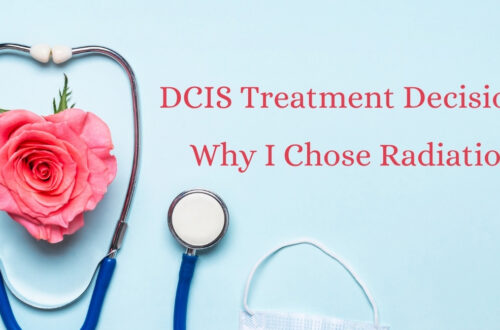
Why is DCIS Controversial?
Why is DCIS Controversial? And what does that mean for patients? When I was diagnosed with DCIS in 2019, I had no idea it was controversial. I knew DCIS was early-stage breast cancer and needed to be treated. But, the idea that it was controversial? That certainly didn’t cross my mind. So, when I noticed the title of the recent ASBrS pre-conference course entitled DCIS controversies, I was curious.
After a full day of learning about DCIS from surgeons, radiologists, and researchers, I walked away with some new insights into why DCIS might be considered controversial and how that may impact our patient experiences in the future.
Important Note: I am not a medical professional. Please take any medical questions you have to your care team. For more information, please see my disclaimer. All information on the page should be considered general advice only.
Overdiagnosis and Overtreatment: Words that are Triggering for Me
The first session of the day was entitled Epidemiology of DCIS- Defining Overtreatment. When I saw that on the docket, honestly, I was pretty triggered. I don’t like the terms overdiagnosis and overtreatment as they apply to my diagnosis.
The theme of overdiagnosis and overtreatment brings up many emotions for me. The diagnosis, treatment, and recovery from DCIS was challenging. If my cancer was overdiagnosed and thus overtreated, then am I overreacting when I talk about my experiences?
Shouldn’t I get over it since the cancer wasn’t that big of a deal anyway?
Talk about an unproductive and dangerous psychological rabbit hole!
I had my guard up as the session began. How would I feel as a DCIS patient when overtreatment was discussed? Thankfully, my fears weren’t realized. The session was quite informative. Now, I can better understand the nuances of overdiagnosis and why it may lead to overtreatment.
History of DCIS
One of the first things discussed was the history of DCIS diagnosis. DCIS was rarely diagnosed before 1980. Interestingly, the increase in DCIS diagnoses parallels the number of mammography machines in the United States. DCIS is commonly detected through mammograms and shows up as calcifications in the imaging.
In the 1980s and 1990s, breast cancer was thought to progress linearly. In this model, breast tissue would move from Normal-DCIS-Invasive. If this cycle could be interrupted with early detection, there would be a statistically significant reduction in breast cancer deaths.
However, this didn’t happen. Breast cancer deaths have reduced, but that isn’t necessarily due to early detection. There have also been significant improvements to breast cancer treatment that have increased lifespans. More study has been done to map the appropriate treatment for the specific types of breast cancer.
Once detected, what is the appropriate course of action with DCIS?
Epidemiology of DCIS- Will it Invade or Not?
One of the most critical questions to untangle is which DCIS will invade and which will not. DCIS is commonly detected with screening- most typically during a mammogram. Once the DCIS is diagnosed via a biopsy, the standard treatment protocol is to remove it.
But what if that DCIS will never progress beyond the area where it was detected? What if it stays put? If that DCIS will never threaten our natural lifespan, why treat it? Especially since cancer treatments are not without their own physical and psychological risks. Current research suggests that about 1 in 4 DCIS lesions will progress to invasive. So that means that 3 out of 4 will not.
But, which type is which? That is the critical question, and that’s where understanding the epidemiology of our specific DCIS comes into play.
Adding to the complexity of this question is that we don’t know why some early-stage breast cancer patients return years later after “successful” treatment with metastatic breast cancer.
DCIS patients have a higher risk of dying of breast cancer than the general population. So clearly, there is more to learn, even if not all DCIS will become invasive.
Research is underway that will hopefully help identify the specific characteristics within DCIS lesions that may cause them to invade. Additionally, several ongoing studies are evaluating the possibility of adding active surveillance to the list of treatment options for DCIS patients.
Defining Overdiagnosis
So what is overdiagnosis anyway? Overdiagnosis can be defined as detecting cancer- usually via screening- that wouldn’t impact a person during their remaining lifespan.
This is abstract, so let’s imagine two different scenarios:
A 70-year-old woman is diagnosed with DCIS after a routine screening mammogram. Biopsy indicates that it is a low-grade DCIS about 5mm in size. What are the options?
- Standard treatment protocol: DCIS is removed via surgery, and she decides to do radiation after surgical recovery. Her treatment takes about four months in total. At age 74, she dies of heart failure- unrelated to the DCIS.
- Active Surveillance (Observation only): DCIS is discussed with the patient, and she is offered the surgical removal option with a recommendation for radiation. After discussing the options with her doctor, she decides to have the lesion observed. She comes in for screening at designated intervals for the next five years. She dies of heart failure at 75. The DCIS never progressed into invasive cancer during her natural lifespan.
In this imaginary scenario, since she died of heart failure at 75, diagnosing and treating cancer didn’t extend her lifespan. Diagnosing her cancer at 70 would be considered an overdiagnosis since that cancer would have never progressed in her natural lifespan. That’s all well and good, but…
Humans Don’t Have Expiration Dates
Unfortunately, humans don’t come with expiration dates. There is no way of knowing with accuracy when each of us will die. That same 70-year-old woman could live well into her 90s because her heart condition was effectively treated with medication. If her lifespan were extended, DCIS would perhaps progress, and she would be required to have more extensive treatment.
Doctors cannot accurately say how long each of us will live. Without this information, it becomes critical to treat the cancers once they are detected.
What is Overtreatment?
Overtreatment is defined as the treatment of cancer that has been overdiagnosed. In the imaginary scenario above, treating the 70-year-old woman’s DCIS with surgery and radiation would be considered overtreatment because she died of heart failure, not of breast cancer. Treating cancer added an entire host of medical procedures to her remaining lifespan that weren’t essential.
However, if she lived to 85 and the DCIS had progressed to invasive at age 77, not treating the DCIS would be considered undertreatment.
What a conundrum!
This situation is why most cancers are removed once detected. There is no reliable way to predict how long we will live and how long it will be before that cancer becomes symptomatic.
How Much Breast Cancer is Overdiagnosed and Overtreated?
Over the last several years, there has been much discussion about overdiagnosis, especially in breast cancer. How often should women get screened? Is it worth it to get a mammogram? Maybe women should be older before they start getting screened.
Recent research suggests that the number of breast cancer cases that might be considered overtreated is much less than previously thought. Estimates have been as high as around 50% of all screen-detected breast cancers are overdiagnosed.
New research indicates that number is highly inflated. The current numbers from a recent study revealed that only about 1 in 7 breast cancers would be considered overdiagnosed. That puts the number of overdiagnosed breast cancers at about 15% – much lower than previously estimated.
A Patient’s Response
If DCIS is so controversial, what does that mean for us? How do we approach our treatment decisions with all of this additional information? As interesting as this new research is, it isn’t going to change our treatments right now.
Currently, active surveillance isn’t a part of the standard treatment protocol for DCIS patients outside of clinical trials. For most of us, this means our treatment decisions are about which type of surgery to have, whether or not to do radiation, and if we should take endocrine therapies as a risk reducer. These decisions aren’t easy to make, and I have many posts that share how I walked through these phases.
Since each of us is in different phases of our lives, the options are not always clear-cut. So what I might pick as a 41-year-old DCIS patient might not be what a 75-year-old DCIS patient would choose. And that’s ok.
I will leave this post with one of the statements I appreciated the most from Dr. Ryser:
It’s about the right choice for each patient, not the correct choice.
Dr Marc D. Ryser, DCIS Controversies Course, ASBrS Annual Meeting 2022
At the time of diagnosis, we must wrestle with this question and then move forward, knowing we did the best we could with the information we had.






Hi Jennifer,
This is such an important topic. No one wants to be overtreated, that’s for sure. But being undertreated is potentially far worse. Until we can figure out which cases of DCIS will invade and which will likely not, we’re sort of treading water. It seems like this has been being studied for a while now, so I keep wondering how much longer to figure this out? And your point about each patient being in a different place and therefore possibly making different choices is a good one. Not just regarding DCIS either, of course. Thanks for writing this.
I agree! It does feel like treading water. I’m glad the research is ongoing, and from what I can tell, some more data in the next few years might move the needle. It feel slow from this perspective though… Thanks for reading and commenting!